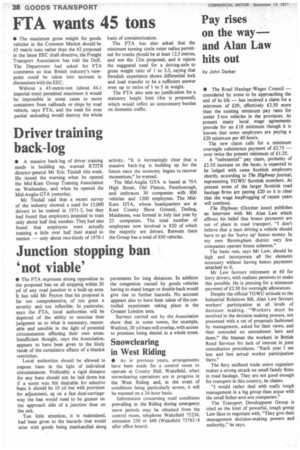Pay rises on the way and Alan Law hits out
Page 40

If you've noticed an error in this article please click here to report it so we can fix it.
by John Darker • The Road Haulage -Wages Council — considered by some to be approaching the end of its life — has received a claim for a minimum of £20, effectively £3.50 more than the existing minimum pay rates for under 5-ton vehicles in the provinces. At present many local wage agreements provide for an £18 minimum though it is known that some employers are paying a £20 minimum per 40 hours.
The new claim calls for a minimum overnight subsistence payment of £2.75 — over twice the present minimum of £1.25.
A "substantial" pay claim, probably of £3.50 increase on the basic, is expected to be lodged with some Scottish employers shortly, according to The Highway journal, representing TGWU Scottish members. At present some of the larger Scottish road haulage firms are paying £20 so it is clear that the wage leapfrogging of recent years will continue.
The Highway (October issue) publishes an interview with Mr Alan Law which affirms his belief that bonus payments are out of place in road transport. "1 don't believe that a man driving a vehicle should have to go for 'hurry up' bonus money. In my own Birmingham district very few companies operate bonus schemes."
The basic rate, says Mr Law, should be high and incorporate all the elements necessary without having bonus payments attached to it.
Mr Law favours retirement at 60 for lorry drivers, with realistic pensions to make this possible. He is pressing for a minimum payment of £2.50 for overnight allowances.
Despite the official TGWU attitude to the Industrial Relations Bill, Alan Law favours workers' participation at all levels of decision making. "Workers must be involved in the decision making process, not presented with a set of proposals fashioned by management, asked for their views, and then conceded an amendment here and there." He blames the workers in British Road Services for lack of interest in joint consultation procedures. "Each year I see less and less actual worker participation there."
The fiery midland trade union organizer makes a strong attack on small family firms in road haulage. They are not good enough for transport in this country, he claims.
"I would rather deal with really tough management in a big group than argue with the small father-and-son companies."
The Transport Development Group is cited as the kind of powerful, tough group Law likes to negotiate with. "They give their management decision-making powers and authority," he says.










































































































































































































